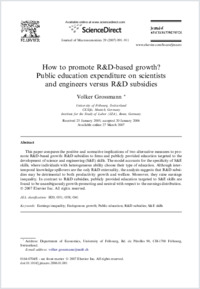How to promote R&D-based growth? Public education expenditure on scientists and engineers versus R&D subsidies
BP2-STS
- Grossmann, Volker ORCID University of Fribourg
- 2007
Published in:
- Journal of Macroeconomics. - Elsevier BV. - 2007, vol. 29, no. 4, p. 891-911
Earnings inequality
Endogenous growth
Public education
R&D subsidies
S&E skills
Economics and Econometrics
English
This paper compares the positive and normative implications of two alternative measures to promote R&D-based growth: R&D subsidies to firms and publicly provided education targeted to the development of science and engineering (S&E) skills. The model accounts for the specificity of S&E skills, where individuals with heterogeneous ability choose their type of education. Although intertemporal knowledge spillovers are the only R&D externality, the analysis suggests that R&D subsidies may be detrimental to both productivity growth and welfare. Moreover, they raise earnings inequality. In contrast to R&D subsidies, publicly provided education targeted to S&E skills are found to be unambiguously growth-promoting and neutral with respect to the earnings distribution.
- Faculty
- Faculté des sciences économiques et sociales et du management
- Department
- Département d'économie politique
- Language
-
- English
- Classification
- Economics
- License
-
Rights reserved
- Open access status
- green
- Identifiers
-
- DOI 10.1016/j.jmacro.2006.01.001
- ISSN 0164-0704
- Persistent URL
- https://folia.unifr.ch/unifr/documents/323698
Statistics
Document views: 75
File downloads:
- 1-s2.0-s0164070407000274-main: 179
